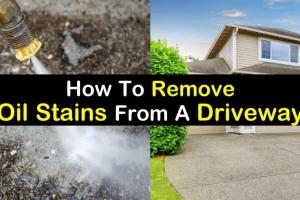Effective Techniques for Removing Oil and Grease Stains from Your Driveway

-
Quick Links:
- Introduction
- Understanding Oil and Grease Stains
- Step-by-Step Removal Methods
- Homemade Cleaning Solutions
- Commercial Cleaning Products
- Eco-Friendly Options
- Prevention Tips
- Expert Insights
- Case Studies
- FAQs
Introduction
Driveways often bear the brunt of our daily lives, and it’s not uncommon for them to become stained with oil and grease from vehicles. Not only are these stains unsightly, but they can also pose a hazard. Fortunately, there are several methods to effectively remove these stains while maintaining the integrity of your driveway. In this comprehensive guide, we will explore the best ways to remove oil and grease stains, backed by expert insights, case studies, and practical tips.
Understanding Oil and Grease Stains
Oil and grease stains are common, especially in homes with multiple vehicles. These stains can originate from:
- Leaking oil from cars
- Spilled gasoline or diesel
- Cooking oil from outdoor grills
Understanding the nature of these stains is crucial for selecting the most effective removal method. Oil-based stains can penetrate porous surfaces like concrete, making them more challenging to remove.
Step-by-Step Removal Methods
Here are some effective methods to remove oil and grease stains from your driveway:
1. Blotting the Stain
For fresh stains, the first step is to blot the area with paper towels or absorbent cloths. Avoid rubbing, as this can spread the stain.
2. Using Baking Soda
Baking soda is a natural absorbent that can help lift the stain from the surface. Here’s how to use it:
- Sprinkle baking soda over the stain.
- Let it sit for at least 30 minutes.
- Scrub the area with a stiff-bristled brush.
- Rinse with water.
3. Applying Dish Soap
Dish soap is effective for breaking down grease. Follow these steps:
- Mix a few drops of dish soap with warm water.
- Apply the solution to the stain.
- Scrub with a brush and rinse thoroughly.
4. Using a Pressure Washer
For tougher stains, a pressure washer can be quite effective:
- Apply a degreaser to the stain.
- Let it sit for the recommended time.
- Use the pressure washer to rinse away the degreaser and stain.
5. Chemical Cleaners
In cases of persistent stains, chemical cleaners specifically designed for oil and grease removal can be effective. Always follow the manufacturer's instructions.
Homemade Cleaning Solutions
If you prefer DIY methods, here are some effective homemade cleaning solutions:
1. Vinegar and Baking Soda
This combination creates a powerful cleaning reaction. Sprinkle baking soda on the stain, then spray with vinegar. Let it bubble and sit for a few minutes before scrubbing.
2. Cornstarch Paste
Mix cornstarch with water to create a paste. Apply it to the stain and let it dry. Once dry, brush it away. Cornstarch absorbs the oil effectively.
Commercial Cleaning Products
There are numerous products available on the market specifically designed for removing oil and grease stains.
- Oil Eater: A biodegradable cleaner that effectively breaks down oil.
- Simple Green: An all-purpose cleaner that’s safe for concrete.
Eco-Friendly Options
For environmentally conscious homeowners, consider these options:
- Bio-based cleaners: Look for products made from renewable resources.
- Citrus-based cleaners: These can effectively cut through grease and are biodegradable.
Prevention Tips
Preventing stains is easier than removing them. Here are some tips:
- Use drip pans or mats under vehicles.
- Regularly maintain your vehicle to prevent leaks.
- Seal your driveway every few years to create a protective barrier.
Expert Insights
According to industry experts, regular maintenance can significantly reduce the likelihood of stubborn stains. They recommend combining proper vehicle maintenance with periodic cleaning to keep driveways looking their best.
Case Studies
In one case study, a homeowner successfully removed years of grease stains from their driveway using a mix of baking soda and dish soap, demonstrating the effectiveness of simple, household ingredients.
FAQs
1. Can I use bleach to remove oil stains from my driveway?
No, bleach can damage the surface and is not effective on oil stains.
2. How long should I let cleaning solutions sit on the stains?
Typically, 15-30 minutes is sufficient for most homemade solutions.
3. Will pressure washing damage my driveway?
If done correctly, pressure washing should not damage your driveway, but be cautious with high settings.
4. Are there any natural alternatives to commercial cleaners?
Yes, vinegar, baking soda, and cornstarch are effective natural alternatives.
5. How can I prevent future stains?
Regular vehicle maintenance and using mats can help prevent stains.
6. How often should I clean my driveway?
It’s recommended to clean your driveway at least once a year, or sooner if you notice stains.
7. What tools do I need for driveway cleaning?
A stiff-bristled brush, pressure washer, and absorbent cloths are essential tools.
8. Can oil stains be removed from asphalt?
Yes, but asphalt may require different products than concrete. Always check the label.
9. What is the best time of year to clean my driveway?
Spring or fall is ideal, as temperatures are moderate and rain helps rinse away residues.
10. Are there any professional services for driveway cleaning?
Yes, many companies specialize in driveway cleaning and maintenance, offering advanced techniques and equipment.
Random Reads
- How to open a door with a credit card
- How to format external drive to FAT32
- How to format dvd rw
- How to format computer
- How to find jelly world on neopets
- How to create a letterhead on microsoft word
- How to change alexa wake word
- How to change alexas language
- How to repair vertical blinds
- How to repair wall cracks